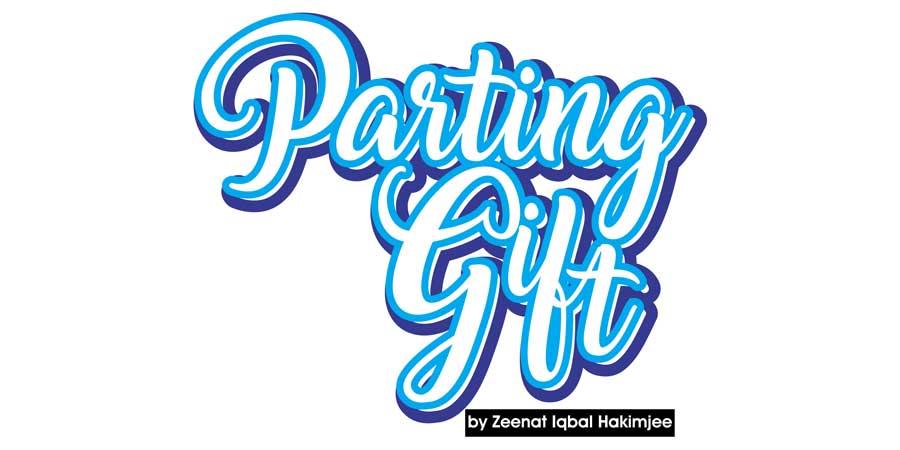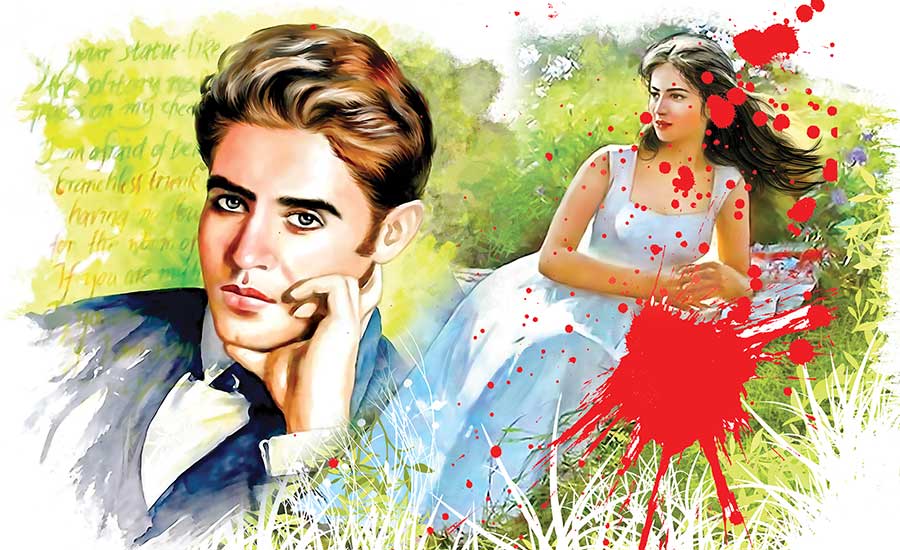THE ORCHARD ON FIRE
- 20 Apr - 26 Apr, 2024

The year 1950
Mark was born in London during the post war period, in the east end of London, which has been largely rebuilt since the World War II, when it suffered much damage from bombing. London at that time was crippled because of the depression which was an after math of the war obviously. The birth of Mark brought relief to his parents – relief from a devastated world. You had to struggle really hard to survive, as London was also economically shattered. It was hard to make ends meet. Even in those days Mark’s house was full of guests. Their family was known well for their hospitality. One instance Mark remembered of his childhood was of his Mom’s spending the last of her saving’s to feed a less fortunate family. ‘Give and you will receive’, she used to say. This image of his mother remained forever with Mark in his adult years.
She worked in a garments factory, which was a part of the textile industry that was established by France, an ally from the war. She brought home samples of the dresses that fitted Mark’s sister, Elizabeth. ‘She’s such a Doll’, remarked a friend of his Mom’s and she’d go pink in the cheeks.
His father accepted building contracts, which were part of the rebuild London project. This is how they slowly and gradually became rich. He, as a building contractor, before putting up a building, used to first look at the site, choose the people who were going to work for him and plan a schedule of work, so that he knew which people should be on the site at the right time. The bricklayers and the plasterer’s would often get in each other’s way. I’ll finish with the bricks in another couple of hours. ‘Oh! So you will, the last time you said a couple of hours, you took eight’. He went off, leaving the bricklayer to finish, who was envious of his long break. He complained, ‘Boss, we both should get equal pay for the hours of work we put in. Mark’s father would tackle the situation, and he planned shifts, so that nobody would have any objection.
Then, there was the time when Elizabeth contracted an infection after swimming in the pool. They gave her a Penicillin shot (which she was allergic to), but it was too late before they found out that she was allergic. She developed a rash, as if the infection were not enough. But they were a close knit family and that saw them coming out of such situations every now and then. Mark held her hand and teased, ‘your face looks like its full of Polka Dots’. ‘You’d know what it feels like if you had them’. Elizabeth, on the verge of tears, told him.
About the same time, in Stalin’s Russia, Susan was born – in a communist setting. Later, she would question Mark about the gap between the haves and the have-nots. ‘Because they deserve to be so’. He’d reply. Many other questions came to her mind, especially about the religion, but her differences were not confirmed. Originally, she remained a Christian. A product of the west, although she cherished faint memories of the large farms set up as collective units which were usually worked by 100 to 500 families, who reaped what they sowed. She was impressed and affected by the equal opportunity. And this would reflect, in her life, later on as would the prosperity of Hampstead heath, which is a large tract of countryside of London. (The latter as told by Mark to her). Her childhood memories would reflect in her adult life later on.

Once during the shortage of wheat (in London – where they were to stay after marriage), she observed that those collective farmers never went hungry, whereas, England imported wheat every year – and it was expensive. Mark would tease her, ‘the average income of a Londoner affords him the necessities as well as the luxuries’. ‘Capitalist thinking, that’, she retorted. With her there would remain a distinction between a necessity and luxury. ‘If it’s not necessary, why to do it then’, was an opinion of hers on many matters.
During his school days Mark enjoyed playing Cricket, and kept himself up to date with the score board of County Cricket. ‘The night watchman just might level the score’. ‘Not if the weather does not permit’. His friends enjoyed the game too. In 1882, Australia beat England at the Oval in London and after the match the ‘Sporting Times’ invented the term ‘The Ashes’. The paper told its readers of the ‘Death of English Cricket.’ The Ashes (from a stump burnt during the England tour of Australia in 1883) are kept in an urn at the Museum at Lord’s. Mark took pride in showing his guests this urn.
A fortune teller once told Mark that after his marriage he would be blissfully happy, but then he somehow did not also want to reveal something to Mark – something terribly sad. He further added that Mark would have to part ways from someone he deeply loved. He said that an evil spirit would be the cause of his parting from someone he deeply loved. He further asked Mark to practice religion. Mark was not religious, at all.
Who could tell that after so many years, life would be different.
Flash-forward to 1970
They were madly in love. Happiness glowed on their cheeks when they faced the colourful world. Mark and Susan were the children of prosperous parents. Life had been kind to them but God’s blessings were only bestowed on a few as it would be proved later on. Kind, as in material possessions. Mark’s house was full of guests. It was there that in fact he met Susan. The first meeting was followed by a series of them. They decided to seal their relationship and with the consent of their parents they got engaged. Mark was a handsome boy. Girls did vie with each other for his attention. One such girl was his parents’ choice for his partner. Obviously, she was his mother’s friend’s daughter. Very compatible, because she was in and out of their house very often and was almost a family member. Mark liked her – but the liking was never to turn into love.
Mark was a businessman; and his commitments kept him busy for the day. ‘The stocks of the company are experiencing a low’. He told a colleague. ‘The clients are not satisfied and are not ready to invest at the moment’. ‘We’ll have to work the nights also’. But he spared some time every day for his beloved. Sometimes with flowers, sometimes over a delicious meal, and sometimes just to remind her that he loved the colour of her eyes; he always had time for such sentiments.
After a brief engagement, they got married. They went off on their honeymoon to Switzerland. Switzerland was an ideal place so to speak. A place without any army.
A peaceful setting, detached from the morbid states engaged in the war. Amongst so many people, from all around the world, the two of them saw each other only. Walking in the shadows of the Alps, hand in hand, they made a commitment never to let this end. ‘Wear your skis. I’ll race you’. ‘I’m too scared’. ‘Take the plunge’. ‘oo---oop---oops’. She was out of sight. Discovered in a pile of snow. ‘I thought I told you to watch it at the curve’. Seeing her red nose poke through the snow, he stifled a giggle. Having made a special trip to separate them, guess who else was there. The same girl. She had not accepted defeat. She tried to blackmail him, by using his mother. Her befitting attitude towards his mother was a result of her long association with him. She was a good cook, unlike his mother and as they say, the way to a man’s heart is through his stomach. She once cooked a meal that was so tasty that they licked their fingers clean. Susan’s ego was offended big time.

But there was always Mark’s shoulder to lean on. He assured and reassured her. There was no need to worry about. The ‘uninvited guest’ would never change his love for her. Other couples saw and look up to them as ideals for a perfect married life. His mother would tell him that marriage was not a bed of roses and not to be disappointed, if anything went against his wishes. She went on, saying that Mark’s father had been short tempered at the start of their marriage and many times she kept quiet when he had an anger fit. Mark’s retort, ‘I know mom, I think I can handle it. You make it sound so difficult, when it is actually not’. ‘The situation would get out of control, otherwise’. She advised him, as any mother would, to her son.
Susan conceived a child in their first year of marriage. Their first child was not going to be planned. The gynaecologist examined her every month. A girl is considered to be a great help for the mother and they desired a girl as their first born. Frills, bows all in pink with linen to match, Susan visualised her daughter’s frocks and her room to be. Susan’s mother had good taste, which showed in Susan’s attire. She was nominated for the best dressed person at a party once.
It was the eighth month of her pregnancy. An ultra sound showed that it was a girl. Yet their elders were reluctant to make any baby clothes or other things for the baby beforehand. They felt that others would be envious, and that was really not a good sign.
‘I can’t wait to see her’. As he felt the baby turn in Susan’s belly. ‘Then you’ll say you’re pressed for time, because she is a handful’. ‘That will never happen’. ‘We’ll see’. She got the last word.
The name, what should the name be. Natasha was selected. Natasha was a Russian name. Susan’s parents had spent some years in Russia. Her father had held a good post in the Pakistan Embassy there. Her mother liked the name and had always wanted to name her grandchild as Natasha.
The delivery time was near. She experienced contractions. The doctor and nurses were by her side. But God’s blessing escaped them. Susan’s life was in danger. On their knees they prayed – the parents. ‘Oh! God, save her – if they are our sins you hold against us, do not make her pay, please God, please’. Some complications developed. Could it be that the evil spirit had entered Susan’s body? The evil spirit that the fortune teller had warned Mark against. Could it be that the profound effort of giving birth and the effort of fighting the evil spirit broke down a weary and tired Susan and finally killed her? Mark awoke to religion as he had been advised by the fortune teller – better late than never. The doctor tried his utmost best to save both the mother and the child. It was touch and go. They all huddled together outside the operation theatre, looking at each other for strength. The doctor arrived, his face sullen. The message he was about to convey to them was obvious.
Susan breathed her last on the shocked Mark’s lap. The parting gift, Natasha, lay in the nurse’s hands. Caught between sorrow and happiness, he had to decide, to get over his sorrow for Natasha, Susan’s and his Natasha.
Even to this day holding Natasha’s finger he visits the grave, talks to her and gets her response. It seems like she tells him, do not give up, for Natasha. And little Natasha clasps her hands in prayer, taught to her by her father. In a whisper, she recites – in the name of the father, the son and the Holy Ghost. Amen. He walks away with the child, a smile on his face, ready to take on to the world. And still in the race is the girl, who however much she tries will not change matters ever or should she try through Natasha. She would not give up at any cost. Mark was worth it. They do not make them quite like him nowadays.
COMMENTS